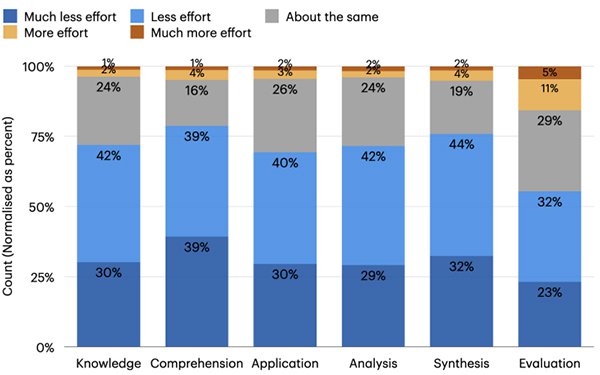
Is something rewiring your brain, remapping circuits and reprogramming ad
strategies, as the advertising industry moves deeper into automation?
A new paper from Microsoft Research finds that humans who increasingly rely on generative AI (GAI) in their work use less
critical thinking that can deteriorate their cognitive abilities.
Microsoft researchers recruited 319 knowledge workers for the study, who self-reported 936 firsthand examples of using GAI in
their job. They were asked to complete a survey about how they use GAI, including tools and prompts, how confident they are in the generative AI tools’ ability to do the specific work task, how
confident they are in evaluating the AI’s output, and how confident they are in their abilities in completing the same work task without the AI tool.
The insights reveal new design
challenges and opportunities for developing GAI tools. The study did not mention advertising, but all apply.
advertisement
advertisement
For tasks such as knowledge retrieval, AI reduces effort by automating information
gathering, but workers must still invest more to verify accuracy of AI outputs. AI simplifies content creation, but workers still need to spend time aligning outputs with specific needs and quality
standards.
Some tasks cited in the paper include using GAI tools like Copilot and ChatGPT that can boost writing productivity by assisting in content generation, idea creation, and stylistic
editing.
There are concerns, however, “novice writers may become overly reliant on these tools, potentially impairing their long-term skill development by bypassing critical writing
processes such as constructing logical arguments and understanding subject matter.”
When a teacher generated an image with DALL-E for her presentation about hand washing at school, she
“noticed it was missing soap dispensers.” She then changed her prompt to include it and tried again. In this case, the teacher had to think about items needed in the image.
The research concluded that while GAI can improve worker efficiency, it can inhibit
critical thinking with the potential to lead to long-term over-reliance on technology that can diminished skill for independent problem-solving.
I feel like Microsoft’s research is a
continuation of how some felt about Google Search in 2007.
Do you remember Nicholas Carr’s article in The Atlantic titled "Is Google Making Us Stupid? He began the article by
describing a scene at the end of Stanley Kubrick’s "2001: A Space Odyssey." The supercomputer HAL pleased with the
astronaut Dave Bowman not to disconnect its memory circuits that control its artificial brain.
“Dave, my mind is going,” HAL says. “I can feel it. I can feel it.”